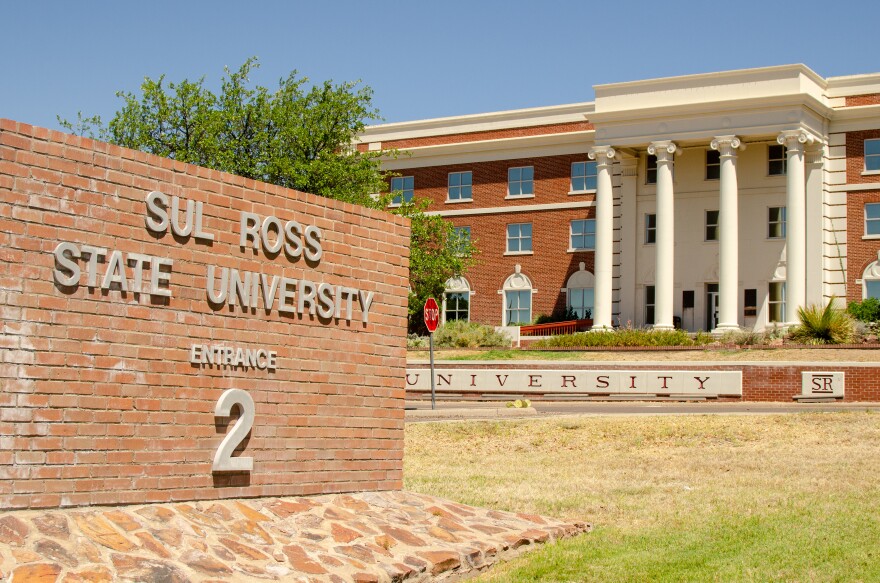In an effort to ensure the “future health and sustainability” of Sul Ross State University, a faculty-led committee is recommending wide sweeping changes at the Alpine school and its satellite campuses in the Middle Rio Grande — ranging from staff firings to eliminating and consolidating degree programs.
In a nearly 20-page re port, the Academic Planning Committee outlined low-performing programs and “other inefficiencies at the university” that could be cut in order to ease financial burdens, which have plagued the rural institution for years. Those “fiscal challenges” were created, the report states, by “the COVID-19 pandemic, static enrollment, a serious budget shortfall and declining state support.”
The committee — which met earlier this year for the first time in Sul Ross State University’s 100-year history — suggested changes to the nursing, chemistry, psychology and agricultural education programs, among others. Additional cutbacks named in the report include cutting professor positions and reducing other university staff.
The cost-saving recommendations, which university President Pete Gallego told local press he’ll decide on by the end of July, have been met with frustration from residents throughout the Big Bend region. Many have sent in emails to the university, expressing concern over the future of the university — particularly its arts programs.
Under the committee’s recommendations, degrees in music, art and theater — including a graduate degree in art — would be consolidated into a single, generalized Bachelor’s program.
If approved, this move would mean the university would eliminate 10 faculty positions across the arts programs and only have a single instructor for each medium and discipline.
The potential changes to the arts programs would have a wide-reaching effect on the Big Bend community, said Sul Ross alum Omar Guerrero, who graduated in 2019 with a degree in music.
Guerrero, who organized a protest against the proposed cuts to the school’s fine arts programs, said the university is a cornerstone of the region and it provides opportunities locals might not have access to otherwise.
“This degree, even though it's from Sul Ross, holds the same weight as a degree from any other university,” he said. Other schools may be larger, but according to Guerrero, “it’s the same degree, a bachelor’s in music — it doesn't change.”

Guerrero is a proud Sul Ross graduate, but worries about the future of the art community in the Big Bend region.
“Whenever we talk about Sul Ross and the arts, we're talking about the whole community, not just about Sul Ross.”
Of the eight programs mentioned in the committee’s report, Spanish studies at both Sul Ross and the Rio Grande campuses is the only program the committee suggests be completely eliminated.
While Sul Ross, which enrolls high rates of Hispanic and first-generation students, has steady enrollment in courses for Mexican-American Studies that “hasn’t translated into enrollment in Spanish language and literature as a popular academic program,” the report finds.
Instead, the committee suggests the university focus on promising programs with stable or growing enrollment like kinesiology, computer sciences and business administration.
“We've got departments at Sul Ross that are growing, and growing at a pretty good clip,” said President Gallego in an interview with Alpine radio station KVLF. “And you've got departments at Sul Ross that are static, or that are shrinking.”
While enrollment numbers at both the Alpine and the Middle Rio Grande campuses have steadily declined in recent years — a note from the Texas Higher Education Coordinating Board finds enrollment at the Alpine campus has dropped from just over 2,050 in 2010 to near 1,970 in 2015, and projects the school’s enrollment will hover near 1,500 in 2025 — Gallego says it isn’t the university’s ability to attract students that’s the problem.
“The single biggest challenge that we face at Sul Ross is not recruitment,” said Gallego during the KVLF interview. “We bring 300 or 400 new kids on campus every year. Our issue is retention. We can't keep them.”
To that end, Gallego pointed to quality-of-life issues. He explained students that transfer away from Sul Ross’ Alpine campus say they’re looking for a better “college life experience” and want more to do in the community and surrounding area.
Beyond merging or eliminating degree programs, the committee’s report points to several other cost-saving options. One suggestion is to offer a “voluntary separation” package for faculty members who are able to retire. Other potential personnel cuts range from reducing the number of deans to letting go of all non-tenure faculty and freezing hires for non-essential staff.
“I've got some hard decisions to make,” said Gallego. “The people these decisions that I'm making, they impact real people.”


